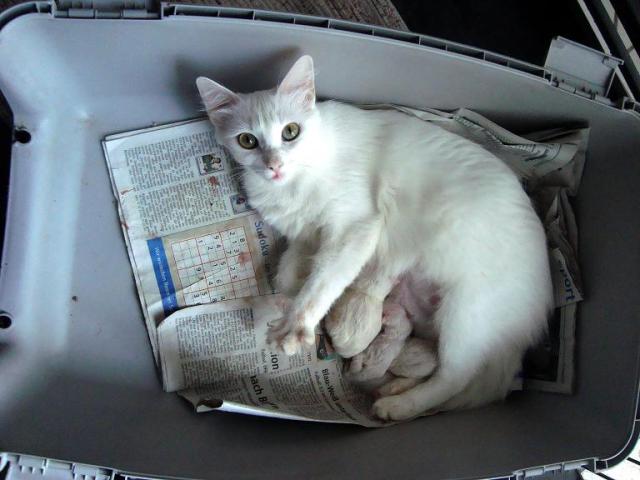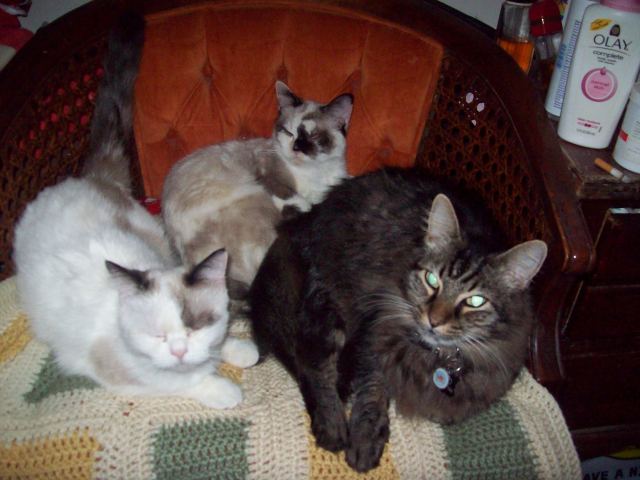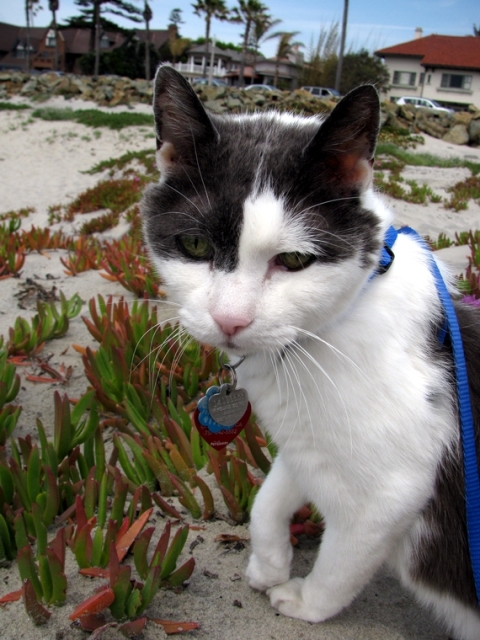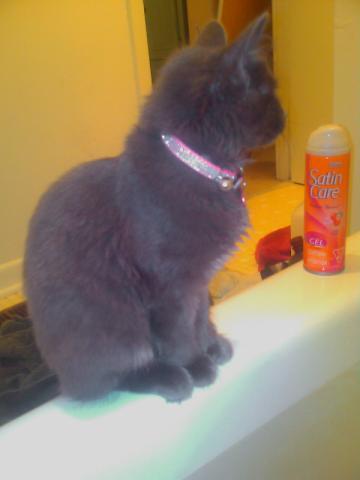QuestionWe recently adopted a kitten from Pets Mart. The kitten was from a local shelter. She was pretty spry when we brought her home but a little under weight. We have had her only a week and she looks terrible. She is so skinny and not active at all. I have taken her to vet. They did a stool test that did not shown anything. Said I should give her boiled chicken to bulk her up. She does love it. We are also giving her antibiotics for 5 days. We are on day 3. She just doesn't seem to be snapping out of it. Is there anything else I can do? She also has diarrhea. She has also had her first set of shots.
AnswerSherry,
While I am sure that your new kitten loves boiled chicken that isn't the only course of action. I am not sure how old your kitten is, what I would suggest is that you make sure that your kitten always has a good quality kitten food to eat free choice. I would also suggest that if your kitten is having trouble keeping weight on that you ask your vet to treat for internal parasites even though the fecal sample didn't show any just so that you will have the peace of mind to know that your kitten doesn't have intestinal parasites of any description. I would also recommend that if your kitten is around 6- 10 weeks old that you consider buying a weaning formula to supplement this kitty's diet and provide a few extra calories that should help to put some weight on your little one. You can usually purchase a weaning formula from your local pet supply store, I use the KMR formulas for hand rearing and weaning because they are generally reasonably easy to find.
I would recommend that you follow the instructions that you were given by your vet including supplementing your kitten's diet with chicken and giving her the antibiotics until they are finished. You may find that your little one will accept boiled chicken even more readily if you dice it, place it in the food processor, add some of the leftover water that you cooked the meat in and puree it to about the consistency of a thick porridge, then I would recommend that you add enough of the kitten weaning formula to make the pureed meat about the consistency of white glue. The nice thing about making a batch of these foods is that they can be easily frozen in ice cube trays and then place the kitten cubes in a ziploc bag, they will keep for about 5 months or so, longer if you have a deep freezer.
It is important for you to understand an important detail about antibiotic therapy whether it is being used in a tiny kitten or a human being. Antibiotics were designed specifically to kill bacteria, the trouble is that they don't differentiate between the normal, healthy bacteria found in the digestive system. Your kitten may not be feeling much like eating simply because she doesn't feel so hot. I usually recommend a simple, cost effective home remedy that many cats love - an unsweetened, preferably organic plain yogurt will replace the bacteria normally found in your kitten's digestive system. I would recommend that you give her 1-2 teaspoons twice a day for the rest of the time that your new kitten is on antibiotics and continue doing so for about 4 days after her last dose of antibiotics.
It is extremely important that you understand that an animal shelter is very stressful so often times when cats or kittens come out of a shelter environment they will contract a viral or bacterial infections. If your kitten still seems somewhat drained then it is quite possible that she is a bit overwhelmed by her new surroundings and having so much human interaction. It is possible that your kitten may be having a slight reaction to her vaccines as many cats and kittens will behave differently than they normally would in terms of becoming substantially more lethargic and apathetic. The University of Guelph has done recent research that suggests that if your kitten is vaccinated properly as a baby, you may be able to cycle her vaccines. This research seems to show that cats who have been vaccinated every year and receive every vaccine may be at a substantially increased risk of developing auto-immune conditions that can actually attack the kidneys or other more serious issues. I have been cycling vaccines for several years now which means that my cats actually don't get vaccines every year, they are always kept up to date in terms of their rabies shot which is fairly standard in most jurisdictions. It would also be worth having a vet of your choosing to perform tests for serious chronic health conditions called feline leukemia or FIV which both act somewhat like HIV/AIDS in people. If your kitten has either of these conditions she may never show symptoms or she may become quite ill and stay that way. I haven't heard of any research that accurately predicts what group any cats that test positive for either or both of these conditions so it really is a question of waiting to see what unfolds. I would suggest that if your kitten is positive for either of these conditions that you not consider adding any cat to your household that doesn't test positive for these very serious chronic health conditions.
Cats of all ages are very territorial and drastic changes in their environment can cause significant anxiety and stress which can lead to viral/bacterial infections. I would recommend that you try a homeopathic remedy called Bach's Rescue Remedy which is a blend of flower essences that works quite well and very safely to reduce anxiety and reassure your kitten so that she is more comfortable. Rescue Remedy is a great tool to help cats and kittens settle down a bit and I have been using it quite frequently for several years sometimes with amazing results. In many different parts of the world veterinarians use Rescue Remedy to help calm pets and even wild animals. I would suggest that you try putting 7 drops of Rescue Remedy in a bowl of fresh water every morning. It isn't a bad idea to consider doing some research in your area to find a holistic vet which is a vet trained in conventional medicine as well as alternative therapies like homeopathy, acupuncture and massage. My vet is a holistic vet and she is absolutely awesome, I have a lot of respect for how she treats my animals and tries to avoid medications that are used fairly frequently to treat anxiety/depression in pets. These medications are normally a small dose of a human anti-anxiety/anti-depressant drugs, it is important that you do your own research before agreeing to treat your kitten with powerful psychotropic drugs as they aren't without risks or side effects.
Another possible explanation for your kitten's anxious behavior is that she may have been born at the shelter and never experienced life outside of a cage for any length of time. I would recommend that you try placing your new kitten into your bedroom with all of the usual kitty amenities (scratch post, litter pan, food, water, a bed, toys) and gradually introduce her to the house room by room. Be sure that you don't place the food next to the litter box as cats won't normally eat where they eliminate. It is important that you take some time daily to hang out (play, cuddle, reassure, etc) with your new kitten if you do decide to minimize her anxiety about having so much room to live in.
If you have any further questions or concerns, or you would simply like to send an update or some pictures my way, please feel free to contact me again.

 Short Tailed Manx Kitten
Question
Una Mica Una Mica
Hello,
I go
Short Tailed Manx Kitten
Question
Una Mica Una Mica
Hello,
I go
 Feline Nutrition
QuestionQUESTION: I also rescue feral cats and kittens
Feline Nutrition
QuestionQUESTION: I also rescue feral cats and kittens
 Litter Box Behaviour
Question
All Kitties
Hello!
Im writing to you fo
Litter Box Behaviour
Question
All Kitties
Hello!
Im writing to you fo
 18 year old cat has blood clots in urine
Question
Tucker
My 18 year old male neutered cat is hyp
18 year old cat has blood clots in urine
Question
Tucker
My 18 year old male neutered cat is hyp
 urgent cat problem
Question
kitty aka chanel
my cat is about 7 mont
urgent cat problem
Question
kitty aka chanel
my cat is about 7 mont